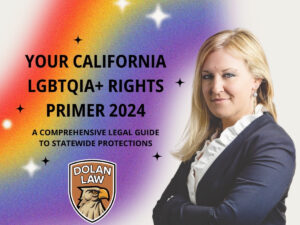By: Christopher B. Dolan and Lourdes DeArmas
Jennifer K. asks: Did Gov. Gavin Newsom just sign into law protection for pedophiles?
Dear Jennifer: No. That is far from the truth.
Pedophiles are not protected under the recently passed California Senate Bill 145. Unfortunately, we are currently living in a reactionary time. We hear something and instead of researching and confirming, we react. Most of the time, our reactions are based on emotion and fear, not logic. As soon as SB 145 was signed into law by Gov. Newsom, Twitter and Facebook were immediately inundated with posts shared thousands of times about how California Democrats “just passed a pro-pedophilia bill” and “they want to protect pedophiles who rape and lure your children” and also: “No felony for having sex with a minors.” #SaveOurChildren started trending on all social media. This is simply wrong!
The fervor over SB 145 clearly exemplifies that there was either an intentional misconstruing of the law in an attempt to mislead and create a reactionary fear, or possibly the fervor came from blatant ignorance and failure to educate oneself. SB 145 has nothing to do with pedophiles and it does not shield predators who rape children. Even in a statutory rape situation, an adult will still be charged with a felony. The legislation merely eliminates anti-LGBTQ+ inequality and actually standardizes the rules about who is required to be on the state’s sex offender registry.
SB 145 is what is called in other states a “Romeo and Juliet law” – and it is limited to consensual relationships that involve non-forcible statutory rape situations and only erases the mandatory registration as a sex offender. Specifically, SB 145 is really a “Romeo and Juliet,” “Romeo and Romeo” and Juliet and Juliet,” type of law. The main point was to protect a young couple who is having consensual sex. Meaning, that neither would have to automatically register as a sex offender. The judge and the prosecutor would have discretion. But SB 145 does not create a new law, it only amends current law to include other non-forcible sexual acts. The cutoff is still 14 years old. The statute does not apply to minors 13 and younger.
Under current California law, vaginal intercourse (specifically penile-vagina) between a minor (14-17 years) and partner within 10 years of age is illegal but does not require mandatory registration as a sex offender. A judge is allowed to decide if the convicted person would be placed on the sex offender registry or not.
This distinction in the law before SB 145, disproportionately targeted LGBTQ+ young people for mandatory sex offender registration, since LGBTQ+ people usually cannot engage in vaginal intercourse. For example, if an 18-year-old heterosexual man has vaginal intercourse with his 17-year-old girlfriend, he can be arrested, charged and convicted of a crime, but is not automatically required to register as a sex offender. The judge is allowed to make that decision. However, if an 18-year-old gay man had sex with his 17-year-old boyfriend, the judge would have been required by law to automatically place the adult on the sex offender registry, regardless of the circumstances.
Therefore, SB 145 only amends current state law to include other types of intercourse such as oral, anal sex and digital penetration. SB 145 eliminates an inequality and discrimination in a sentencing law that has harmed LGBTQ+ youth related to California’s sex offender registry.
To be clear, SB 145 has no effect on the level of crime prosecuted or sentencing for that crime. It only takes away automatic sex offender registration and leaves it up to a judge to make that determination. The laws against sex with minors remain intact. It is still illegal to have sex with a minor under the age of 18.
More importantly, nothing in SB 145 would protect an individual who commits a sex offense against a minor under 14, nor can they take advantage of the discretionary relief provision. Luring a minor for sex is also not protected under this bill. Those types of sex offenders are predatory and would not benefit from the changes in SB 145.
Our state is inching towards equal rights in all forms of laws to LGBTQ+. Unfortunately advances towards equality under the law, such as SB 145, are marred with personal biases and fear mongering.










